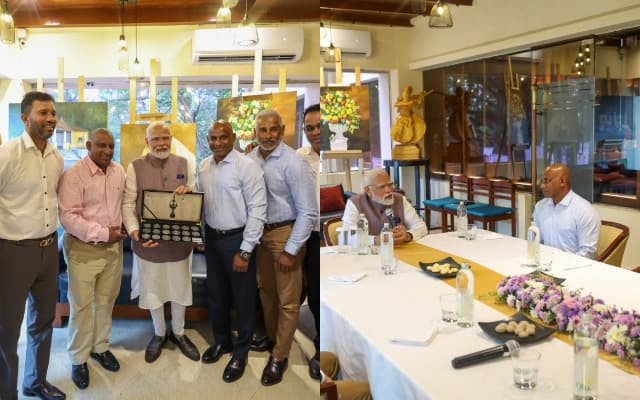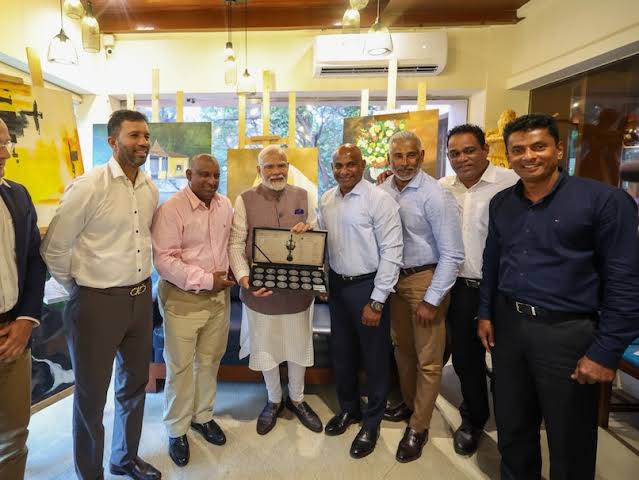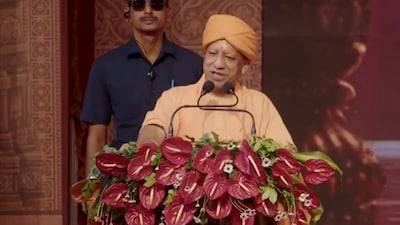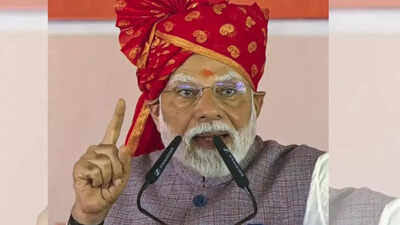In a heartwarming gesture that transcended sport and politics, Prime Minister Narendra Modi met with the members of the iconic 1996 Sri Lankan cricket team during his visit to Colombo. The interaction was filled with warmth, nostalgia, and mutual admiration, as both sides fondly remembered moments that had once united the subcontinent through the spirit of cricket.
 The Prime Minister shared how the 1996 team’s unforgettable World Cup victory still holds a special place in the hearts of Indian cricket fans. He acknowledged the revolutionary playing style that the Sri Lankan team introduced to the world, which he believes laid the groundwork for modern-day T20 cricket. Recalling his own experiences, Shri Modi spoke of watching a 2010 match in Ahmedabad where a former Sri Lankan player officiated as an umpire, highlighting how cricket continues to forge strong bonds between the two nations.
The Prime Minister shared how the 1996 team’s unforgettable World Cup victory still holds a special place in the hearts of Indian cricket fans. He acknowledged the revolutionary playing style that the Sri Lankan team introduced to the world, which he believes laid the groundwork for modern-day T20 cricket. Recalling his own experiences, Shri Modi spoke of watching a 2010 match in Ahmedabad where a former Sri Lankan player officiated as an umpire, highlighting how cricket continues to forge strong bonds between the two nations.
One particularly moving part of the conversation was the Prime Minister’s reflection on India’s decision to play in Sri Lanka during the 1996 World Cup, even after a devastating bomb blast had led other countries to withdraw. He noted that the Sri Lankan players still remembered and appreciated that gesture of solidarity. That spirit, he said, reflects India’s core values — standing by its neighbors in both triumph and tragedy. He also recalled his visit to Sri Lanka after the 2019 church attacks and mentioned how the Indian cricket team followed soon after, once again underscoring the enduring partnership between the two countries.
Former cricketer and current coach of the Sri Lankan men’s cricket team, Sanath Jayasuriya, expressed heartfelt gratitude to Prime Minister Modi for India’s timely and generous support during Sri Lanka’s recent economic crisis. He also took the opportunity to request support in developing an international cricket stadium in Jaffna — a move that would open doors for young talent in the north-eastern region of the country.
Responding with empathy, Prime Minister Modi reiterated India’s unwavering commitment to its “Neighbourhood First” policy. He spoke about India’s consistent and swift responses to crises in the region, including its role as the first responder during the recent earthquake in Myanmar. He emphasized that India considers it a responsibility — not just a gesture — to stand with its neighbors, particularly Sri Lanka, during times of need. He acknowledged the importance of the Jaffna proposal and assured that his team would earnestly explore its feasibility.
As the conversation drew to a close, the Prime Minister expressed his gratitude for the warm welcome and the chance to reconnect with legends of the game. His words reflected not only fondness for cricket but also a deep respect for the shared history and future of India and Sri Lanka. In a world often marked by divisions, moments like these remind us of the unifying power of sport, friendship, and empathy.




